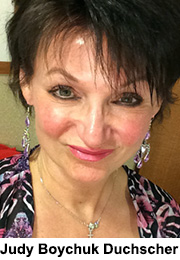The author highlights the work of Tracey Bucknall, a nurse researcher from Australia inducted into Sigma’s International Nurse Researcher Hall of Fame at ceremonies in Calgary.
 As an educator of undergraduate nursing students, researcher in the area of professional role transition for newly graduated nurses, and public consumer of nursing practice, I am particularly sensitive to and interested in how we prepare students to make decisions that are safe and enhance outcomes. Given that most newly graduated nurses enter practice in the “crazy, tragic, sometimes almost magic, awful, beautiful” context of acute care, it is critical that we understand how this dynamic and complex arena of practice influences that all-important concept of clinical decision-making.
As an educator of undergraduate nursing students, researcher in the area of professional role transition for newly graduated nurses, and public consumer of nursing practice, I am particularly sensitive to and interested in how we prepare students to make decisions that are safe and enhance outcomes. Given that most newly graduated nurses enter practice in the “crazy, tragic, sometimes almost magic, awful, beautiful” context of acute care, it is critical that we understand how this dynamic and complex arena of practice influences that all-important concept of clinical decision-making.
My recent exploration of how the clinical decision-making of newly graduated nurses differs from that of their more seasoned colleagues introduced me to Patricia Ebright, PhD, RN, associate professor emerita of Indiana University School of Nursing, who coined the term “stacking.” Stacking is the process nurses use to determine priorities in care, and it illuminates the intricate and experientially informed decisions that motivate modification of those priorities. When I heard Ebright speak about the relative inflexibility of newly graduated nurses to modify their priority decisions, I was hooked.
My interests as a researcher are evolving into a deepening understanding of the importance of practice—you can’t teach that—in establishing the cognitive flexibility that arises out of clinical pattern recognition, as taught by Patricia Benner, PhD, RN, FAAN. Capacity to recognize changes to clinical presentation comes only when you have seen multiple iterations of a particular situation. This situational familiarity enables a practitioner to recognize danger when he or she sees it.
Enter Tracey Bucknall, PhD, RN, Alfred Deakin professor at Deakin University School of Nursing and Midwifery and director of nursing research at Alfred Health in Australia. A 2019 inductee into Sigma’s International Nurse Researcher Hall of Fame, Bucknall has spent years exploring nurse decision-making and has expanded our understanding of what influences it. She calls attention to the cognitive rigidity that nurses can develop as a result of the high levels of stress they experience in everyday hospital practice and why we should care about it. Her work, primarily with critical care nurses and rapid response/medical emergency teams, is important in furthering our understanding of how we should introduce newly graduated nurses into the fast-paced, highly dynamic context of hospital practice. We must do it slowly, intentionally, and progressively!
Some very concerning data has come out of Bucknall’s work, including evidence of the high prevalence of fatal events caused by failure of nurses to recognize deterioration in their patients. Of particular interest to me are Bucknall’s observations that newly graduated nurses are cognitively “socialized” into managing their heavy workloads through “shortcutting.” Those of us who are in our fourth decade of nursing know that, although shortcutting is often appropriate and necessary, it must be grounded in the solid, intuitive knowledge of one who has been there and done that and who knows when and what to cut. Unfortunately, says Bucknall, rather than grounding the practice of shortcutting in sound clinical rationale, it is often portrayed as “coping with workload,” with obvious ramifications for patient safety.
The practice of shortcutting can render newly graduated nurses cognitively rigid because their ability to respond to changes in their patients’ conditions is not informed by a growing foundation of knowledge. In the end, suggests Bucknall, the issue is not “whether or not we have the systems in place to respond to concerns regarding the deteriorating clinical status of our patients,” but whether practitioners have the capacity (the cognitive flexibility and capability to recognize patterns) and ability (as allowed by time and situation) to recognize and act upon their clinical concerns.
Thank you, Dr. Bucknall, for your work. It provides fodder for me and many other researchers to advocate for changes on how and where we introduce newly graduated nurses into practice. RNL
Judy Boychuk Duchscher, PhD, RN, is an associate professor at Thompson Rivers University School of Nursing in Kamloops, British Columbia, Canada.